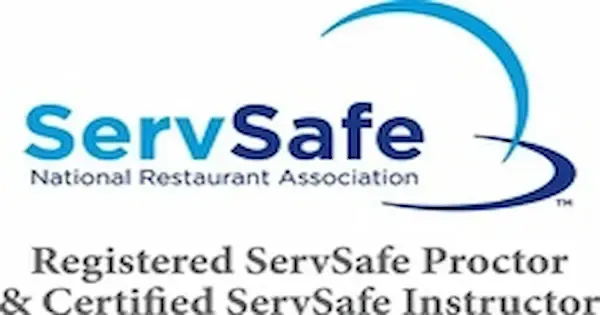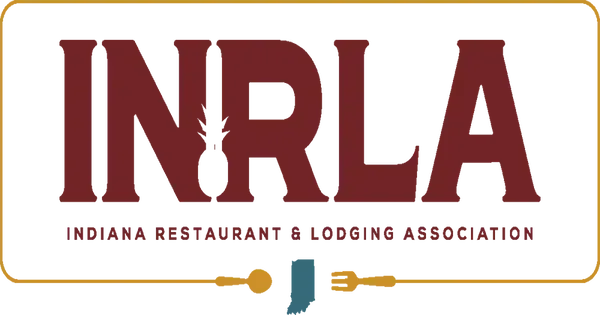ServSafe® Certification
Ready to Get Certified?
Pick the training option that meets your needs! Not sure what you need? Scroll down for more information.
Your Guide to ServSafe® Certification
Which program do you need? General information is below by state, but it's crucial for individuals and businesses to
always check with their local health department for specific requirements.
Indiana
- Individuals who work in a licensed food service establishment such as a restaurant, food truck, school food service program, corporate dining, etc. will typically need
ServSafe Manager certification. These individuals are typically business owners, managers, managers-in-training, shift supervisors, etc. Earning the certification makes that individual a Certified Food Protection Manager (CFPM). Indiana requires one CFPM in every licensed establishment.
- People who run a business out of their home (home-based vendors) typically need ServSafe Food Handler certification. Indiana does NOT recognize food handler certification with regard to licensed food service establishments. Some employers might require food handler training under company policy.
- ServSafe Allergen certification, while being an excellent training tool for managers and employees is NOT required in Indiana.
Illinois
- Individuals who work in a licensed food service establishment such as a restaurant, food truck, school food service program, corporate dining, etc. will typically need
ServSafe Manager certification, but there are exceptions. Earning the certification makes that individual a Certified Food Protection Manager (CFPM). These individuals are typically business owners, managers, managers-in-training, shift supervisors, etc. Illinois typically requires one certified person to be on-site during all operating hours of the establishment.
- All line-level employees who work with unpackaged food, food equipment or utensils, or food-contact surfaces such as servers, bartenders, cooks, dishwashers, etc. are required to have a
ServSafe Food Handler certification with very limited exceptions.
- ServSafe Allergen certification is typically required for CFPM's in most food service establishments, but there are exceptions.
Michigan
- Individuals who work in a licensed food service establishment such as a restaurant, food truck, school food service program, corporate dining, etc. will typically need
ServSafe Manager certification. These individuals are typically business owners, managers, managers-in-training, shift supervisors, etc. Earning the certification makes that individual a Certified Food Protection Manager (CFPM). Michigan requires at least one full-time manager at a food service establishment to be a CFPM. This person must actively manage the operation for at least 30 hours per week.
- ServSafe Food Handler certification is not required by law, but is highly recommended. Some employers might require food handler training under company policy.
- ServSafe Allergen certification, while being an excellent training tool for managers and employees, is NOT required in Michigan. Some employers might require certification under company policy.
Ohio
- Individuals who work in a licensed food service establishment such as a restaurant, food truck, school food service program, corporate dining, etc. will typically need
ServSafe Manager certification, but there are exceptions based on the type of business. These individuals are typically business owners, managers, managers-in-training, shift supervisors, etc. Earning the certification makes that individual a Certified Food Protection Manager (CFPM).
- There is not a statewide food handler certification requirement in Ohio. Some employers might require ServSafe Food Handler certification under company policy.
- Ohio does not have a statewide requirement for a separate food allergen certification. Some employers might require ServSafe Allergen certification under company policy.
Kentucky
- All Kentucky food facilities that handle unpacked food are required to have at least one certified food protection manager (CFPM) on duty. These individuals are typically business owners, managers, managers-in-training, shift supervisors, etc.
ServSafe Manager certification would meet this requirement.
- ServSafe Food Handler certification requirements are often determined at the county level. Many counties require all food service workers to have a food handler card. This includes anyone who handles food and drink, such as cooks, waiters, bartenders, and dishwashers. The certification must typically be renewed every few years.
- While there is no statewide mandate for
ServSafe Allergen training, the state's food code does require managers to demonstrate knowledge of the major food allergens and how to prevent cross-contact. Many counties may have their own rules.
Your Guide to ServSafe® Certification
Which program do you need? General information is below, but it's crucial for individuals and businesses to
always check with their local health department for specific requirements.
ServSafe® Manager
Food manager training is required for the person in charge of a food service operation. This training leads to a Certified Food Protection Manager (CFPM) credential and is for individuals in a supervisory role, such as a restaurant owner, kitchen manager, or a designated shift leader.
Indiana
Retail food establishments must have a certified food protection manager; food handler training is not enough. While a certified food protection manager is not required to be on-site at all times, a "person in charge" (who may need to demonstrate the same knowledge) must be. The certification must be from an ANSI-accredited program, such as ServSafe®.
Illinois
All food establishments must have a CFPM present during all hours of operation. To get certified, you must complete an ANSI-accredited training course and pass an exam. This certificate is valid for five years.
Michigan
The Michigan Food Law requires at least one full-time manager at a food service establishment to be certified in food safety. This person must actively manage the operation for at least 30 hours per week and pass an ANSI/CFP nationally accredited exam.
Ohio
Ohio's food safety program has two levels: Person-in-Charge (Level 1) and Food Manager (Level 2). Risk level III and IV food establishments must have at least one employee with a Level 2 Manager Certification who has supervisory and management authority.
Kentucky
The requirement for a certified food manager is often determined at the county level. Many counties require establishments to have a certified food protection manager on-site who can direct and control food preparation and service.
ServSafe® Food Handler
A food handler is any food service employee who handles unpackaged food, food equipment, utensils, or food contact surfaces. This typically includes cooks, chefs, servers, bussers, and dishwashers. While the ServSafe® Manager certification is for supervisors, food handler training is for the rest of the staff. The specific requirements for who needs this training can vary by state and even by local health department.
Indiana
Indiana's state law does not have a statewide food handler requirement, but some local health departments and employers do. Additionally, as of July 2022, home based food vendors are REQUIRED to obtain a food handler certification. It's best to check with your specific county's health department or your employer to confirm local rules. People working in retail food service establishments in Indiana typically need the food manager certification.
Illinois
Illinois law requires all food handlers to receive food handler training within 30 days of employment. The training must be from an American National Standards Institute (ANSI) accredited provider. This is mandatory for anyone working with unpackaged food, food equipment, utensils, or food contact surfaces, unless they already hold a valid Certified Food Protection Manager (CFPM) certification.
Michigan
Michigan law does not have a statewide requirement for food handler certification. However, many employers in the state voluntarily require their employees to complete a food safety training to ensure a safe work environment and reduce the risk of foodborne illness.
Ohio
Ohio does not have a statewide food handler certificate requirement. Instead, the state has two required certifications: a "Person-in-Charge" (Level 1) and a "Food Manager" (Level 2). A Person-in-Charge, who must be on site during all hours of operation, needs a Level 1 certification. Food handler training is a helpful but voluntary practice for other staff.
Kentucky
In Kentucky, food handler certification requirements are often determined at the county level. Many counties require all food service workers to have a food handler card. This includes anyone who handles food and drink, such as cooks, waiters, bartenders, and dishwashers. The certification must typically be renewed every few years.
ServSafe® Allergens
While a general food protection manager certification includes a section on allergens, a specific food allergen manager training may be required in some states to address the increasing prevalence of food allergies. Here’s a breakdown of the requirements in each of the specified states.
Indiana
There is no statewide mandate for a separate food allergen manager certification. However, the general Certified Food Protection Manager (CFPM) training required for managers in Indiana does cover food allergens. The Indiana State Department of Health requires managers to demonstrate knowledge of major food allergens to a health inspector.
Illinois
Illinois has a specific law requiring Certified Food Protection Managers (CFPMs) in Category I restaurants to complete a separate, ANSI-accredited allergen awareness training within 30 days of employment and every three years thereafter. This is in addition to the standard CFPM certification.
Michigan
While Michigan once had a specific mandate for food allergen training for managers, it is no longer in effect. However, the Certified Food Protection Manager (CFPM) exam, which is required for managers, still includes questions on food allergens. Many employers may still voluntarily require this training to ensure customer safety.
Ohio
Ohio does not have a statewide requirement for a separate food allergen manager training. As with Indiana and Michigan, the general Food Manager (Level 2) certification covers allergens, and a person in charge must be able to demonstrate knowledge of this subject.
Kentucky
Kentucky's food handler and manager certification requirements are often determined at the county level. While there is no statewide mandate for a separate food allergen manager training, the state's food code does require managers to demonstrate knowledge of the major food allergens and how to prevent cross-contact. Many counties may have their own rules.
Why Choose Hoosier Hospitality Consulting?
Live Expert Instruction
Flexible Scheduling
Up-to-Date Materials
Personal Support
ServSafe® Manager FAQs
What is ServSafe®?
ServSafe® is a food and beverage safety training and certificate program administered by the U.S.-based National Restaurant Association. The program is recognized and accredited by the ANSI-National Accreditation Board (ANAB) and the Conference for Food Protection. It provides essential training and certification for food service professionals to ensure they can handle food safely and prevent foodborne illnesses. Passing the ServSafe® exam is often a requirement for food service managers in many states and jurisdictions.
Where can I take a ServSafe® class/test?
HHC offers public classes in Indiana and Illinois. Private classes for groups of 10+ are available in Indiana, Illinois, Michigan, Ohio and Kentucky. A list of public classes can be found below. Walk-ins are not permitted; pre-registration is required. The class location and address will be sent via a confirmation email after you sign up.
How long are ServSafe® certifications good for?
ServSafe® Food Manager Certification is valid for five years. Food Handler Certification and ServSafe Allergen Certification are good for three years.
How do I find my ServSafe® certificate?
ServSafe® no longer provides physical certificates. After passing the exam, you can access your certificate by creating an account on the ServSafe® website. From there, you can view, save, or print it.
How long is the ServSafe® exam?
The exam session lasts for a maximum of two hours.
Can a ServSafe® class be scheduled for a private group?
We can schedule a custom class for your group of 10 or more people at a time and location of your choice. We will discuss any additional costs for the meeting space or travel when you book.
How long are the classes?
The class runs for eight hours, from 8:00 a.m. to 4:30 p.m. local time, and is immediately followed by a two-hour exam. Remember to be mindful of the time zone.
Do I need to sign up in advance?
You must sign up in advance to reserve your seat and receive your study materials. We recommend signing up early to give yourself plenty of time to study.
How do I sign up and pay for a class?
Select a certification type above, fill out the required information, and complete your purchase in the cart. To pay over the phone or without a credit card, call 317-447-4761 to make arrangements.
Do I have to take the class, or can I just take the exam?
State requirements vary: In Indiana, Michigan, and Kentucky, you can take just the exam. In Illinois and Ohio, you are required to take the eight-hour class and pass the exam.
What is a passing score on the exam?
The ServSafe Food Protection Manager exam has 90 questions (80 graded) with a passing score of 70%. The passing score for the ServSafe Food Handler and ServSafe Allergens exams is 75% of 40 questions.
What if I fail the exam?
If you fail the exam, you can re-test to earn your certification. If you attended our class, the re-test only costs the $40 exam code, and you can retake the class for free. Otherwise, the re-test costs $70.
You can re-test immediately after your first failed attempt, but must wait 60 days after your second, third, or fourth failed attempt. There is a limit of four attempts per calendar year.
What book do I need to have?
You need the official ServSafe Manager 9th Edition book from the National Restaurant Association. Older editions or books from other companies are not recommended as they may contain outdated or incorrect information.
Do I need to buy a new book?
You're not required to buy a new book; you can borrow a used one or share a copy. However, we strongly recommend you bring a textbook to class and study it beforehand.
Do I get my books and exam codes in advance?
Books are shipped in advance so you can study before the class, assuming shipping time allows. Exam codes, however, are only provided in person on the day of the class.
Do I need to study in advance?
Yes, you should study in advance. The eight-hour class covers a lot of information, and being familiar with the content will make it easier and help you achieve a better score. We recommend focusing on chapters 2, 4, 5, 6, and 7.
Still have a question?





